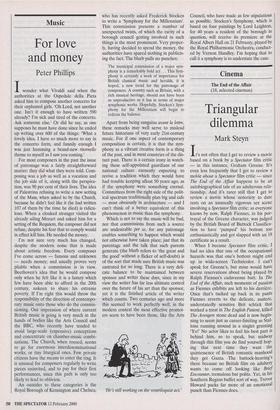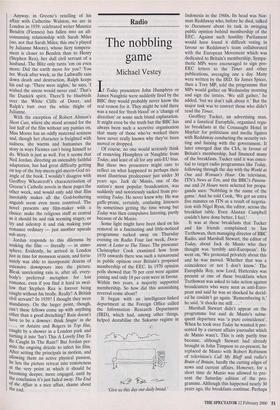Cinema
The End of the Affair (18, selected cinemas)
Triangular dilemma
Mark Steyn
It's not often that I get to review a movie based on a book by a Spectator film critic — in this instance, Graham Greene. It's even less frequently that I get to review a movie about a Spectator film critic — since The End of the Affair happens to be an autobiographical tale of an adulterous rela- tionship. And it's rarer still that I get to review a movie whose notoriety to date rests on an unusually vigorous sex scene involving a Spectator film critic: as everyone knows by now, Ralph Fiennes, in his por- trayal of the Greene character, was judged by the British Board of Buttock Classifica- tion to have 'pumped' his bottom too enthusiastically and got slapped with an 18 certificate as a result.
When I became Spectator film critic, I had no idea that one of the occupational hazards was that one's bottom might end up in wide-screen Technicolor. I can't speak for Greene's, but mine would have severe reservations about being played by Ralph Fiennes's cadaverous butt. In The End of the Affair, such moments of passion as Fiennes exhibits are left to his derriere. Once that's tucked up back in its pants Fiennes reverts to the delicate, austere, understatedly sensitive Brit schtick that worked a treat in The English Patient, killed The Avengers stone dead and is now begin- ning to seem just as career-limiting as Stal- lone running around in a singlet grunting 'Yo!' No actor likes to feel his best part is behind him, so to speak, but midway through this film you do find yourself hop- ing that next time they want the quintessence of British romantic manhood they get Gazza. The buttock-heaving's there because no British film on adultery wants to come off looking like Brief Encounter, tremulous but polite. Yet, in his Southern Region buffet sort of way, Trevor Howard packs far more of an emotional punch than Fiennes does. Anyway, in Greene's retelling of his affair with Catherine Walston, we are in London in 1939: celebrated writer Maurice Bendrix (Fiennes) has fallen into an all- consuming relationship with Sarah Miles (no, not that Sarah Miles; this one's played by Julianne Moore), whose fiery tempera- ment is closer to Bendrix than to Henry (Stephen Rea), her dull civil servant of a husband. The Blitz only turns 'cm on even more; Did the earth move for you? You bet. Week after week, as the Luftwaffe rain down death and destruction, Ralph keeps his end up. 'There were nights,' he says, 'I wished the sirens would never end.' That's the Dunkirk spirit. There'll be bluebirds over the White Cliffs of Dover, and Ralph's butt over the white thighs of Julianne.
With the exception of Robert Altman's Short Cuts, where she stood around for the last half of the film without any panties on, Miss Moore has an oddly maternal sexiness and, though her character is freighted with sadness, she warms and humanises the story in ways Fiennes can't bring himself to do. Which is just as well. For it seems that Neil Jordan, directing an ostensibly faithful adaptation, has had great difficulty getting on top of the boy-meets-girl-meets-God tri- angle of the book. I wouldn't disagree with Geoffrey Wheatcroft's characterisation of Greene's Catholic novels in these pages the other week, and would only add that film inevitably makes all the God-bothering anguish seem even more contrived. The novel presents any film-maker with a choice: make the religious stuff as central as it should be and risk seeming stagey, or try and sidestep it and risk making your romance ordinary — just another upscale sob story.
Jordan responds to this dilemma by soaking the film — literally — in atmo- sphere. Evidently, he arrived in London just in time for monsoon season, and fortu- nately was able to incorporate dozens of extensive downpours into the picture. Bleak unrelenting rain is, after all, every- body's preferred metaphor for lost romance, even if you find it hard to swal- low that Stephen Rea is forever being caught without his brolly. Really? A British civil servant? In 1939? I thought they were mandatory. On the larger point, though, can't these fellows come up with anything other than a good drenching? Rain doesn't have to be a downer: think Singin' in the •• • , or Astaire and Rogers in Top Hat, caught by a shower in a London park and turning it into 'Isn't This A Lovely Day To Be Caught In The Rain?' But Jordan per- mits the ongoing drizzle to infect his film. After setting the principals in motion, and allowing them an active physical passion, he lets the picture retreat into remoteness at the very point at which it should be becoming deeper, more engaged, until by the conclusion it's just faded away. The End of the Affair is a nice affair, shame about the end.



































































 Previous page
Previous page